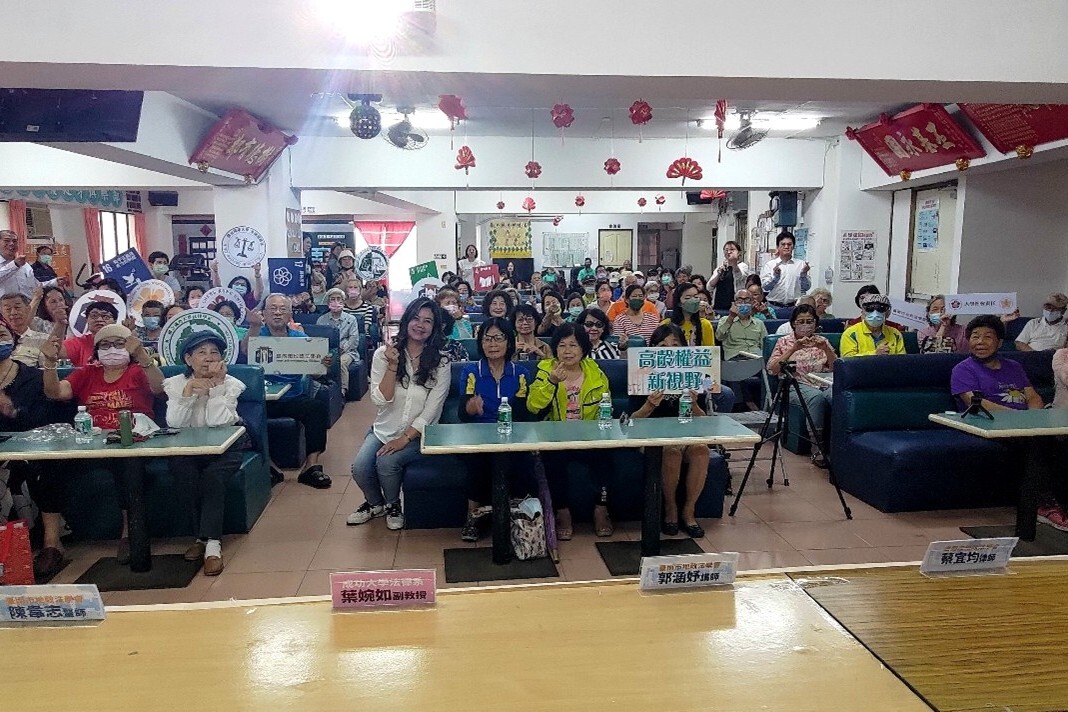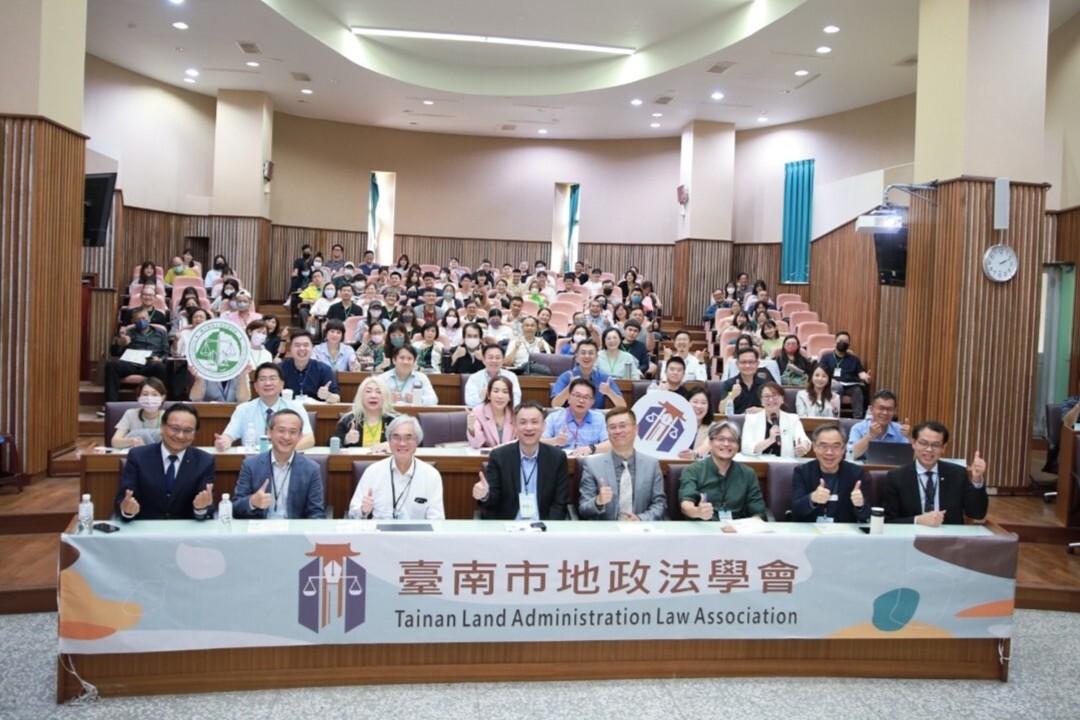National Cheng Kung University (NCKU) and Kun Shan University (崑山科技大學), along with other affiliated colleges and departments, jointly hosted the 2025 Greater Southern Spatial Planning and Governance Legal Forum (2025 大南方空間規劃治理法制論壇) at NCKU, which recently concluded successfully. Over 300 participants from industry, government, and academia attended, discussing key topics such as the transition of national land planning systems, housing justice amid high property prices, and urban integration and regional development driven by rail infrastructure. The forum also offered forward-looking policy recommendations and legal perspectives on spatial governance and sustainable development in the Greater Southern Region.
Distinguished attendees included NCKU Vice President Yuh-Neu Chen (陳玉女) and Tainan City Deputy Mayor Ching-Hui Chao (趙卿惠). In her speech, Vice President Chen emphasized that the forum brought together expertise and experience from academia, government, and industry to address crucial issues affecting people’s livelihoods, including national land planning, housing justice, and railway undergrounding. Noting that young people face significant challenges in purchasing homes, she said the forum aimed to outline a vision for a “happy city” and hoped that collaborative efforts would help transform Tainan into a “Cultural Ancient Capital” and a “World Smart City” that combines cultural heritage with innovative intelligence.
Deputy Mayor Chao praised the forum’s contributions to urban development and highlighted NCKU as the city government’s “largest think tank.” She noted that when facing urban development challenges and new issues, the city government relies on NCKU’s expertise to propose practical, forward-looking, and implementable strategies.
In her closing remarks, Dean Chun-Li Tsai (蔡群立) of NCKU’s College of Social Sciences stated that the forum successfully demonstrated academia’s deep concern for Tainan and the Greater Southern Region’s development. The forum not only promoted dialogue between urban governance and citizens but also provided concrete policy recommendations and theoretical support. Moving forward, the College will continue fostering interdisciplinary collaboration, integrating academic research with policy practice, and advancing ongoing discussions and implementation of spatial governance in the Greater Southern Region, collectively shaping a new vision of a “Cultural Ancient Capital and World Smart City.”
The forum was divided into three main sessions, each focusing on a specific theme—national land planning transformation, housing justice, and rail-based economic development—examining the region’s development strategies from institutional, social, and spatial perspectives.
Session 1: New Perspectives on Urban-Rural Development Under National Land Planning
This session focused on the transition of national land planning systems and urban-rural development in the Greater Southern Region. General Manager Yi-Ling Ku (古宜靈) of Guan-Gu Development Consultants emphasized that the challenge in implementing national land plans is not a matter of “inability to push forward,” but rather a lack of consensus, with farmland issues being particularly critical as farmland value has shifted from “productive value” to “exchange value.”
Professor Tzu-Yuan Chao (趙子元) of NCKU’s Department of Urban Planning noted that following the implementation of the National Land Planning Act, statutory tools such as metropolitan area plans should be effectively utilized to integrate resources and balance land and environmental planning in the Greater Southern Region.
Chen Chih-Hung (陳志宏), Director of the Urban and Rural Development Office of Pingtung County Government, shared that Pingtung has been incorporated into the Executive Yuan-approved “Greater Southern New Silicon Valley Plan,” with a three-zone development strategy: Pingbei for industry, Pingzhong for living and water resources, and Pingnan for cultural tourism, focusing on semiconductor and space technology industries.
Session 2: Social Development and Innovation in the Greater Southern Region — Balanced Transformation for Housing Justice
Tainan City’s housing price-to-income ratio reaches 9.71, with mortgage burdens around 45%, indicating medium-to-high affordability challenges. Dean Chun-Li Tsai highlighted that since 2019, housing prices in Tainan have risen 41.34% over five years, with an annual growth rate (4.88%) 2.5 times higher than household income growth (1.84%). Rising housing prices are closely linked to the expansion of the Southern Taiwan Science Park and the development of the Shalun Science Park.
Associate Professor Wan-Ju Yeh (葉婉如) of NCKU’s Department of Law used AI-based sentiment analysis (Cardif NLP model) to find that young people generally hold neutral or negative views toward policies such as rent subsidies, social housing, and the New Youth Housing Loan Program, reflecting the limited effectiveness of these policy tools. The New Youth Housing Loan Program is also criticized as a mechanism enabling speculative housing. Yeh emphasized that high housing costs have become a major obstacle for youth development, potentially leading to class stratification, low birth rates, and political disengagement.
Associate Professor Pei-Fen Kuo (郭佩棻) of NCKU’s Department of Surveying and Spatial Information analyzed the walkability and surrounding environment of nursing institutions using Google Street View and AI (SBI Percept), finding that medium-fee nursing homes performed worst in safety and convenience, highlighting the importance of “housing quality justice” in an aging society.
Session 3: Railway Undergrounding and Urban Integration Reshaping Tainan’s Real Estate Landscape
Director Ming-Te Wang (王銘德) of Tainan City’s Department of Transportation stated that the railway undergrounding project and the resulting greenway will integrate the city and promote human-centered transportation, marking an important milestone for Tainan’s development. Chou-Min Lin (林洲民), lead architect at Zhong-Guan United Architects, introduced the “South Railway Greenway” design concept, aiming to maximize greenery and construct a 1.5 km elevated green corridor along Linsen Road to Minzu Road, raised 6 meters, expected to reduce surrounding perceived temperature by 11.4°C.
Regarding rail transit, Tainan Metro is adopting a monorail system, with Phase 1 of the Blue Line under Executive Yuan review. The “Deep Green Line” will connect the Southern Taiwan Science Park, Shalun Science City, and the urban core, forming a “three-core” city development pattern.
Former CEO of JLL, Cheng-Yi Chao (趙正義), noted that urban development should adopt a multi-core, transit-oriented development (TOD) approach, leveraging high-density development around metro stations to exchange for floor area incentives to provide social housing, balancing development with housing justice. Director Wang emphasized that metro planning should be led by urban development and land development authorities to ensure transportation infrastructure aligns with city growth.
The 2025 Greater Southern Spatial Planning and Governance Legal Forum was jointly organized by NCKU’s College of Social Sciences, College of Planning and Design, Department of Law, Department of Urban Planning, and the Center for Safety, Health, and Sustainable Development, in collaboration with Kun Shan University’s Department of Real Estate Development and Management and the Tainan City Land Administration Law Association.
Distinguished attendees included NCKU Vice President Yuh-Neu Chen (陳玉女) and Tainan City Deputy Mayor Ching-Hui Chao (趙卿惠). In her speech, Vice President Chen emphasized that the forum brought together expertise and experience from academia, government, and industry to address crucial issues affecting people’s livelihoods, including national land planning, housing justice, and railway undergrounding. Noting that young people face significant challenges in purchasing homes, she said the forum aimed to outline a vision for a “happy city” and hoped that collaborative efforts would help transform Tainan into a “Cultural Ancient Capital” and a “World Smart City” that combines cultural heritage with innovative intelligence.
Deputy Mayor Chao praised the forum’s contributions to urban development and highlighted NCKU as the city government’s “largest think tank.” She noted that when facing urban development challenges and new issues, the city government relies on NCKU’s expertise to propose practical, forward-looking, and implementable strategies.
In her closing remarks, Dean Chun-Li Tsai (蔡群立) of NCKU’s College of Social Sciences stated that the forum successfully demonstrated academia’s deep concern for Tainan and the Greater Southern Region’s development. The forum not only promoted dialogue between urban governance and citizens but also provided concrete policy recommendations and theoretical support. Moving forward, the College will continue fostering interdisciplinary collaboration, integrating academic research with policy practice, and advancing ongoing discussions and implementation of spatial governance in the Greater Southern Region, collectively shaping a new vision of a “Cultural Ancient Capital and World Smart City.”
The forum was divided into three main sessions, each focusing on a specific theme—national land planning transformation, housing justice, and rail-based economic development—examining the region’s development strategies from institutional, social, and spatial perspectives.
Session 1: New Perspectives on Urban-Rural Development Under National Land Planning
This session focused on the transition of national land planning systems and urban-rural development in the Greater Southern Region. General Manager Yi-Ling Ku (古宜靈) of Guan-Gu Development Consultants emphasized that the challenge in implementing national land plans is not a matter of “inability to push forward,” but rather a lack of consensus, with farmland issues being particularly critical as farmland value has shifted from “productive value” to “exchange value.”
Professor Tzu-Yuan Chao (趙子元) of NCKU’s Department of Urban Planning noted that following the implementation of the National Land Planning Act, statutory tools such as metropolitan area plans should be effectively utilized to integrate resources and balance land and environmental planning in the Greater Southern Region.
Chen Chih-Hung (陳志宏), Director of the Urban and Rural Development Office of Pingtung County Government, shared that Pingtung has been incorporated into the Executive Yuan-approved “Greater Southern New Silicon Valley Plan,” with a three-zone development strategy: Pingbei for industry, Pingzhong for living and water resources, and Pingnan for cultural tourism, focusing on semiconductor and space technology industries.
Session 2: Social Development and Innovation in the Greater Southern Region — Balanced Transformation for Housing Justice
Tainan City’s housing price-to-income ratio reaches 9.71, with mortgage burdens around 45%, indicating medium-to-high affordability challenges. Dean Chun-Li Tsai highlighted that since 2019, housing prices in Tainan have risen 41.34% over five years, with an annual growth rate (4.88%) 2.5 times higher than household income growth (1.84%). Rising housing prices are closely linked to the expansion of the Southern Taiwan Science Park and the development of the Shalun Science Park.
Associate Professor Wan-Ju Yeh (葉婉如) of NCKU’s Department of Law used AI-based sentiment analysis (Cardif NLP model) to find that young people generally hold neutral or negative views toward policies such as rent subsidies, social housing, and the New Youth Housing Loan Program, reflecting the limited effectiveness of these policy tools. The New Youth Housing Loan Program is also criticized as a mechanism enabling speculative housing. Yeh emphasized that high housing costs have become a major obstacle for youth development, potentially leading to class stratification, low birth rates, and political disengagement.
Associate Professor Pei-Fen Kuo (郭佩棻) of NCKU’s Department of Surveying and Spatial Information analyzed the walkability and surrounding environment of nursing institutions using Google Street View and AI (SBI Percept), finding that medium-fee nursing homes performed worst in safety and convenience, highlighting the importance of “housing quality justice” in an aging society.
Session 3: Railway Undergrounding and Urban Integration Reshaping Tainan’s Real Estate Landscape
Director Ming-Te Wang (王銘德) of Tainan City’s Department of Transportation stated that the railway undergrounding project and the resulting greenway will integrate the city and promote human-centered transportation, marking an important milestone for Tainan’s development. Chou-Min Lin (林洲民), lead architect at Zhong-Guan United Architects, introduced the “South Railway Greenway” design concept, aiming to maximize greenery and construct a 1.5 km elevated green corridor along Linsen Road to Minzu Road, raised 6 meters, expected to reduce surrounding perceived temperature by 11.4°C.
Regarding rail transit, Tainan Metro is adopting a monorail system, with Phase 1 of the Blue Line under Executive Yuan review. The “Deep Green Line” will connect the Southern Taiwan Science Park, Shalun Science City, and the urban core, forming a “three-core” city development pattern.
Former CEO of JLL, Cheng-Yi Chao (趙正義), noted that urban development should adopt a multi-core, transit-oriented development (TOD) approach, leveraging high-density development around metro stations to exchange for floor area incentives to provide social housing, balancing development with housing justice. Director Wang emphasized that metro planning should be led by urban development and land development authorities to ensure transportation infrastructure aligns with city growth.
The 2025 Greater Southern Spatial Planning and Governance Legal Forum was jointly organized by NCKU’s College of Social Sciences, College of Planning and Design, Department of Law, Department of Urban Planning, and the Center for Safety, Health, and Sustainable Development, in collaboration with Kun Shan University’s Department of Real Estate Development and Management and the Tainan City Land Administration Law Association.

Industry, government, and academia come together at the 2025 Greater Southern Spatial Planning and Governance Legal Forum.

Participants listened attentively to the insightful remarks of the speakers on stage.

The forum concluded successfully.

SDG16NCKU Law Department Promotes Legal Education on Elder Rights in the Community – All Are Welcome to Join
View more
SDG16The "2025 Fucheng Land Administration and Law Forum" successfully concluded on the 15th
View more



















